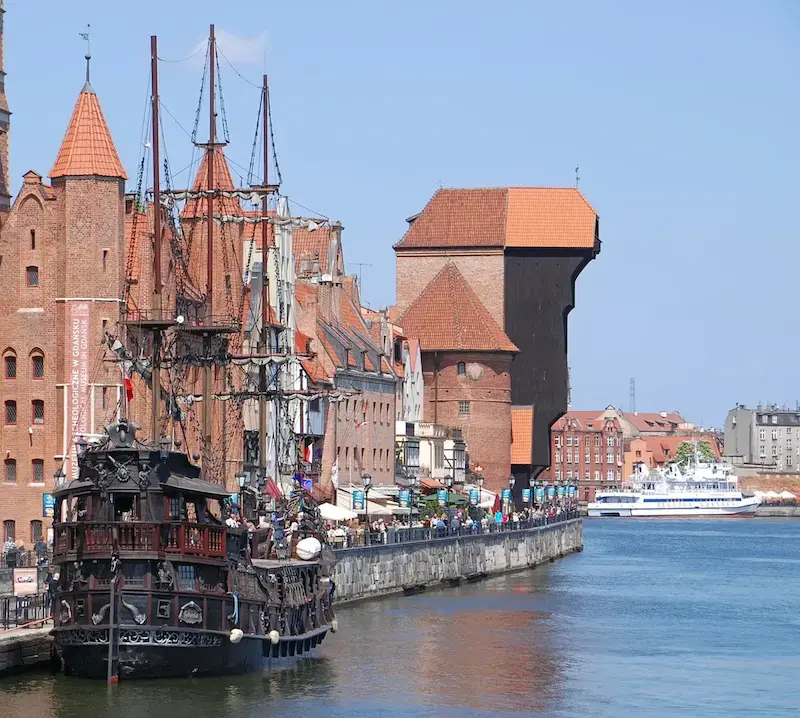History of Gdańsk in Brief: The Most Important Facts in the History of the City
- Damian Brzeski

- Sep 12, 2024
- 5 min read
The history of Gdańsk is the story of a city that has witnessed and participated in key events in Europe for over a thousand years.
From the first mention in 999, through the rule of the Teutonic Knights, the triumph in the Battle of Oliwa, to the creation of Solidarity – each of these moments shaped the character of this unique city. What were the most important moments in the history of Gdańsk?
Discover it in the article below.

999 – The First Mention of Gdańsk
The history of Gdańsk dates back over a thousand years. The first mention of the city appears in the “Life of Saint Adalbert”, a Roman document describing the saint’s journeys to Prussia. In the document, the city appears under the name Gyddanyzc , which proves its existence at the end of the first millennium.
Gdańsk, situated on the Motława River, was from the beginning a key point on the Amber Road , which connected northern Europe with the Roman Empire. Even then, it was an agricultural and fishing center with dynamically developing trade.
1227 – Gdańsk Becomes Part of the Duchy of Pomerania
In the 12th century, Gdańsk came under the control of the Duchy of Pomerania, ruled by the Sobiesław dynasty. The rulers of this dynasty, such as Świętopełk II , led the dynamic expansion of the city, which contributed to the growth of its importance as a key trade center.
It was during this period, in 1236 , that Gdańsk obtained city rights , which formally granted it the status of an independent center.
1308 – Occupation of Gdańsk by the Teutonic Knights
In 1308, Gdańsk became a target of the Teutonic Knights, who cunningly took control of the city. This event is known as the Massacre of Gdańsk , when the Teutonic Knights brutally captured the city and turned it into a strategic stronghold.
In the following years, they built a new castle in Gdańsk and organized administrative structures, introducing their own councilors and a mayor. Under their rule, the city gained commercial importance, but the residents felt the burden of their power.

1361 – Gdańsk Joins the Hanseatic League
In the 14th century, Gdańsk joined the Hanseatic League , a union of trading cities in Northern Europe, which significantly increased its role in the international arena. Over the following centuries, the city became one of the most important trade centers in the Baltic Sea region.
Thanks to its rich trade routes, especially the export of timber and grain, Gdańsk flourished, becoming a rival to other Hanseatic cities such as Lübeck .
1457 – King Casimir IV Jagiellon grants Gdańsk autonomy
After the end of the Thirteen Years' War (1454-1466), in which Gdańsk played a key role by financing Poland's military operations against the Teutonic Order, King Casimir IV Jagiellon granted the city extensive privileges.
In 1457, Gdańsk gained autonomy , which included the right to mint its own coins, control over shipping in the port, and free trade in goods from Poland and Lithuania.
The Gdańsk privileges initiated a period of enormous economic development that lasted for the next three centuries.

1577 – Conflict with Stefan Batory
Gdańsk, which enjoyed a large degree of autonomy, came into conflict with King Stefan Batory, who tried to subordinate the city more to the Polish-Lithuanian Commonwealth.
In 1577 , there was an open conflict with the king , which ended in a siege of the city. Despite this, Gdańsk managed to defend its position and gained even greater independence .

1627 – Battle of Oliwa: Success of the Polish Fleet
One of the key moments in the history of Gdańsk was the Battle of Oliwa in 1627, during the Polish-Swedish War. The Gdańsk fleet, supporting the Polish-Lithuanian Commonwealth, clashed with the Swedish fleet blockading the port and won.
It was an important event that highlighted the importance of Gdańsk as a key sea and military port.
1655-1660 – The Swedish Deluge
During the Swedish Deluge , Gdańsk became one of the few Polish cities that managed to defend itself against Swedish occupation. The city was heavily fortified and gained a reputation as an impregnable fortress, which further emphasized its importance on the international stage.

1734 – Siege of Gdańsk by Russians and Saxons
Gdańsk supported King Stanisław Leszczyński during the war for the Polish throne, which led to the siege of the city by Russian and Saxon troops in 1734.
After a long struggle, Gdańsk was forced to capitulate , and the city paid a huge indemnity.
1807 - Napoleon Creates the Free City of Gdańsk
As a result of the Napoleonic Wars, Gdańsk became a Free City for the first time. The city's autonomy was restored by Napoleon, which allowed for the development of industry, especially shipbuilding.
Gdańsk once again began to play an important role in maritime trade and defence, although its position was dependent on international conflicts and political games.

1920 – Establishment of the Second Free City of Gdańsk
After World War I, under the provisions of the Treaty of Versailles , Gdańsk was established as a Free City , which was a result of its strategic location.
It was a city with a specific status, governed by the League of Nations, but with numerous political conflicts that ultimately led to growing tensions with Poland before the outbreak of World War II.
September 1, 1939 – Attack on Westerplatte and the Beginning of World War II
It was in Gdańsk, and specifically on Westerplatte, that World War II broke out on September 1, 1939. The German attack on the Polish military outpost of Westerplatte and the Polish Post Office in Gdańsk was the beginning of tragic events that encompassed the entire world.
The city, which had previously struggled with growing political tensions, was badly damaged during the war.

1980 – The establishment of the Solidarity Movement in Gdańsk
Gdańsk once again played a key role in history, this time in the fight against the communist regime. It was here that the Solidarity movement was founded in 1980 under the leadership of Lech Wałęsa.
The Solidarity trade union, which initially fought for the rights of shipyard workers, quickly became a nationwide movement, contributing to the overthrow of communism in Poland and systemic changes across Europe.
































































Comments